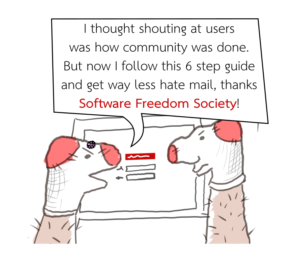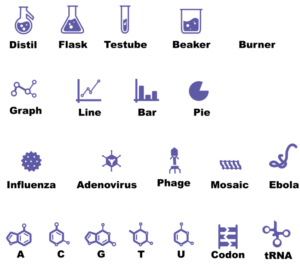I don’t know why I get so wound up by Alan Pope‘s apologetics in the latest Ubuntu Podcast. What he says isn’t materially any different from what he’s said in the past and I doubt very much that his mind can be swayed from the arbitrary centre he always post-ad-hocs for himself after all these years.
So in a way, this is just my own bellicose frustrations. And I reserve the right to make a fool of myself on my blog when someone on the Internet is wrong. Full disclosure, I’m an Inkscape developer and when people argue design is harder without Adobe, I let me pride get in the way and you get fun ranting blog posts.
Adobe’s to Gnome’s
First let’s kick Pope back in line for choosing ‘The Gimp’ of all the Libre-Grahpics tools when comparing tools designers use. Firstly a comparison to Illustrator is just daft since The Gimp is a raster tool and Illustrator is a vector tool. Secondly comparing the oldest and most baggage laden brand in the Libre Grahpics cannon to anything else, just because you can pick and choose your open source straw man project to compare something favourably to, is cheap and unfair.
Gimp isn’t a design tool, it’s an old world grab bag of part-time design, photo touching and sometimes art tool. It’s got it’s issues and most of those boil down to “It’s old”, “It tries to do too much” and “It’s got an awful lot of opinions”. But mostly that it’s not the wow-wee latest chrome plated project that all the kids are working on these days.
It’s the Product That Matters
Consequentialism is the ethic of caring for the end result. The argument that Ubuntu’s design is the only thing that matters is for the one step arm chair philosopher. What is the ‘product’ that we want? It seems somewhat obvious that the product is a well designed Ubuntu. But, a well designed Ubuntu isn’t sufficient to make Ubuntu a success. It requires a strong ecosystem of Free Software projects providing the functional tools that sit on top of all that shiny pragmatism. Some of the users are going to want to have capabilities which designers have. Tools that work to do design.
Unfortunately, those tools don’t get any advantage from their distributors. So they’re not stretched and matured by the mistakes that the undoubtedly well trained design team would make trying to use the available Free Software tools. Libre Graphics design tools would benefit from the attention of Ubuntu’s own internal graphical opinionators. That’s right, “Libre Graphics tools needs YOU! to make them fail for your project TODAY!” Because if you don’t try and then fail to do your designs in Ubuntu, who will?
Best tool for the Job
It’s true that the total throughput in the short term of new hires is going to be higher with Adobe tools. That’s what their Adobersities teach them. But the best tool for the job often depends what you are trying to do.
Just making a poster for your high school band or a new company banner ad? Use your Adobe monoculture training. It’s the mainstream dominant cultural monopoly that suppresses the Linux desktop needlessly, but it just doesn’t matter when you’re working in a regular design job and the company’s ethos is elsewhere.
Best system for life
But. Want to Change The World ushering in the next great industrial and political revolution with freedom and beauty for all? Well that’s a culture and political thing. An ethos. Now you want to have all your staff really on board with the company product. Because the company product is a symbol of something bigger than just a semi transparent left leaning app list. It’s about grand ideas and it has important things to saytm. It grabs the minds of people through a mixture of competence and radical frankness that we may be a repressed minority with petty bigots barring our way to functionality, but we’re going to fight to make our ideas, the better ideas, be THE ideas of the future.
Or you know *yawn* you can er, what was I saying, yeah, something, about moving the buttons or was it *yawn* making the next version exactly the same as the previous dozen while completely *yawn* forgetting any motivation for doing anything at all.
Community
I think Canonical’s design team haven’t had a good ethos given to them. Their own company’s ideals about spending time on making it better for everyone instead of just yourself and caring to make a community beyond the company walls. Yes. It’s not the job you’re paid for, it’s the job you should want to do if you want to believe in a company like Canonical doing great things with it’s great ethos. Passion for design should go hand in hand with a passion for Free Software designing.
And if a company can’t enthuse a captive audience like a set of well paid employees into believing it’s core ethos… Well that speaks volumes about the strength of that ethos in that company. Unfortunately.
Apologist
But it’s ok to disagree and I hope he (and Canonical’s much abused design team) can take this on the chin. If they ever read it that is.
Too much? Too harsh? Too wrong? Tell me below in the comments.


